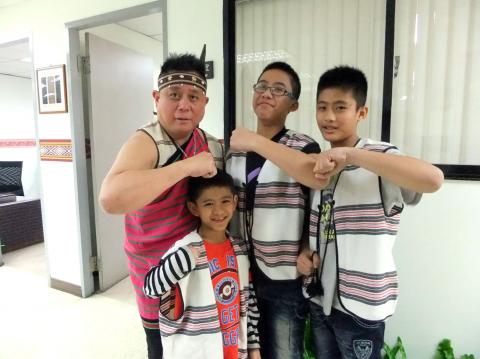A manager at a technology company uses his weekends to teach schoolchildren of all ages Atayal ceremonies, dances and language.
Over the past 12 years, Wang Yung-hsiung (王永雄) — an Atayal from Tatung Township’s (大同) Sungluo community in Yilan County — has taught hundreds of students in northern Taiwan.
Having grown up in an Atayal community, Wang is fluent in that Aboriginal language. He moved to Taipei to find work after finishing junior-high school.

Photo: Shih Chih-ju, Taipei Times
When he turned 40, Wang learned the Wade-Giles system for writing romanized Chinese and used the system to help him pass the Atayal language proficiency certification test. He became a registered teacher of the language after taking additional training courses.
“It is very embarrassing to hear others wondering why an Aboriginal cannot speak their own language,” Wang said.
Recognizing that Aboriginal children growing up in the cities lack the environment in which to learn their native language, Wang, who lives in New Taipei City’s (新北市) Xindian District (新店), started driving around Taipei and New Taipei City on weekends to teach Aboriginal children the language.
Wang teaches using games, or by visiting the children’s families to introduce them to Atayal traditions and dances.
He also helped form basketball teams for girls in an effort to bring the people together, he said.
Wang said he had considered tatooing his face — as was customary for an adult Atayal — but his wife talked him out of it.
Wang said his wife initially had also been against his running around so much, complaining that he spent too little time with his family.
“She did not understand at the time,” Wang said.
However, as a compromise, he brought her along to classes on the weekends, he said.
Wang said he encourages his own children to use the Atayal language.
He said that upon his retirement in two years time, he would like to focus all his work on preserving Atayal traditions.

Taiwanese can file complaints with the Tourism Administration to report travel agencies if their activities caused termination of a person’s citizenship, Mainland Affairs Council Minister Chiu Chui-cheng (邱垂正) said yesterday, after a podcaster highlighted a case in which a person’s citizenship was canceled for receiving a single-use Chinese passport to enter Russia. The council is aware of incidents in which people who signed up through Chinese travel agencies for tours of Russia were told they could obtain Russian visas and fast-track border clearance, Chiu told reporters on the sidelines of an event in Taipei. However, the travel agencies actually applied

Japanese footwear brand Onitsuka Tiger today issued a public apology and said it has suspended an employee amid allegations that the staff member discriminated against a Vietnamese customer at its Taipei 101 store. Posting on the social media platform Threads yesterday, a user said that an employee at the store said that “those shoes are very expensive” when her friend, who is a migrant worker from Vietnam, asked for assistance. The employee then ignored her until she asked again, to which she replied: "We don't have a size 37." The post had amassed nearly 26,000 likes and 916 comments as of this

New measures aimed at making Taiwan more attractive to foreign professionals came into effect this month, the National Development Council said yesterday. Among the changes, international students at Taiwanese universities would be able to work in Taiwan without a work permit in the two years after they graduate, explainer materials provided by the council said. In addition, foreign nationals who graduated from one of the world’s top 200 universities within the past five years can also apply for a two-year open work permit. Previously, those graduates would have needed to apply for a work permit using point-based criteria or have a Taiwanese company

The Shilin District Prosecutors’ Office yesterday indicted two Taiwanese and issued a wanted notice for Pete Liu (劉作虎), founder of Shenzhen-based smartphone manufacturer OnePlus Technology Co (萬普拉斯科技), for allegedly contravening the Act Governing Relations Between the People of the Taiwan Area and the Mainland Area (臺灣地區與大陸地區人民關係條例) by poaching 70 engineers in Taiwan. Liu allegedly traveled to Taiwan at the end of 2014 and met with a Taiwanese man surnamed Lin (林) to discuss establishing a mobile software research and development (R&D) team in Taiwan, prosecutors said. Without approval from the government, Lin, following Liu’s instructions, recruited more than 70 software